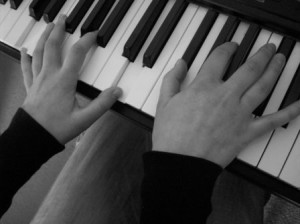We’ve uploaded a new resource – the sheet music for ‘Unheard song’. You can find it – together with the audio, chord sheet and story behind the song – on our songs page.
Here Liz Baddaley, who wrote the song, tells us a little more about the background behind it:
‘A few months after For the sake of the poor – a song I wrote about climate change – had been in circulation amongst the Christian Aid network, one of my colleagues asked if I had anything similar about HIV and AIDS that he could use for World Aids day services. I didn’t.
‘And I wasn’t entirely sure that anything very specific would be possible – or helpful.
‘But the thought wouldn’t go away, and during one afternoon of more deliberate song -writing I began to write this song.
‘It is not inspired by a single person, but by numerous stories I have heard, particularly from child-headed families orphaned by AIDS related illnesses.
‘Central to the concept of the song is the idea that it is as if it is written by someone else – but she will never be given a voice – hence the title.
‘I find it a difficult song to sing – it is uncomfortably raw and real.
‘This song is a protest song really, though it could be used in worship contexts as a stimulus for prayer, or a performed piece to give a voice
to the voiceless in worship.
‘Please feel free to use the recording, which has deliberately been left stark, and has the voice fighting to be heard against the din of city life and competing languages.
‘However, the song was written with a harmonic structure, so you will find the chord sheet contains this if you want to perform the song with a musical backing instead.
‘I have also used just the lyrics projected and silence while people read them as a poem, or silent prayer meditation, which people have found very moving, and could be particularly effective at an HIV/AIDS prayer vigil.
‘There are many brilliant benefits and blessings to the worship scene and industry that the western church has generated over recent decades. But one of its greatest weaknesses is that it is western rather than worldwide.
‘The songs of praise and petition written by so many Christians go unheard because they lack the opportunities to minister to the wider church,
as well as the opportunities of education and material access that people more often talk about as poverty.
‘Perhaps part of the reason for the church’s struggle to create and articulate songs of justice is because the part of the body best placed for their voicing is effectively silenced.’
